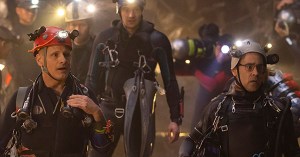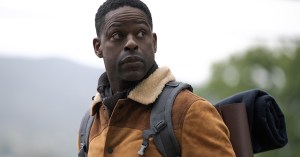Walter Murch on Youth Without Youth: The RT Interview (With Exclusive Photos and Clips!)
The legendary editor of Apocalypse Now and The English Patient talks Coppola's latest.

This week, Francis Ford Coppola‘s Youth Without Youth hits theaters in limited release. The tale of a writer who becomes young again after being struck by lightning is a personal one for Coppola, so it’s apropos that legendary editor and longtime collaborator Walter Murch helped him realize his vision.
One of the most important and influential craftsmen of the “Movie Brat” generation that came of age in the 1970s, Murch has worked as a film and/or sound editor on such landmark films as American Graffiti, The Godfather Part II, The Conversation, Apocalypse Now, The Unbearable Lightness of Being, and The English Patient. Youth Without Youth is the latest in a long line of collaborations with Coppola; their professional relationship stretches back to 1969, when Murch handled the sound editing on The Rain People.
Murch remains one of the few editors to work standing up, comparing editing film to working as a surgeon or a short-order cook. But he’s no stodgy traditionalist; Murch has been a champion of technological advances in editing, cutting Cold Mountain on Final Cut Pro at a time when AVID was still the industry standard.
In an interview with Rotten Tomatoes, the three-time Oscar winner discussed Coppola’s professional reemergence after 10 years away from the director’s chair, how the tools of the moviemaking trade have changed, and why making movies is like making honey. (Plus, check out an exclusive clip from the movie here.)
What is it about you and Francis Ford Coppola that clicks?
Walter Murch: We clicked right away. We started working together in 1969, which is almost 40 years. I like the way his mind works. I like the adventuresome areas that he goes into. He once described directing as “being the ringmaster for a circus that is inventing itself.” That kind of circus is very interesting to me — being around that — and by the same token I think he likes the way my mind works in complimentary form to his. I’m adventuresome also but also very systematic. I think the two sides — adventuresome and systematic — compliment each other.
Youth Without Youth is a puzzle of a movie. Do you approach a film like this the same way you approach a more linear film?
WM: Yeah, I think so. Every film is a puzzle really, from an editorial point of view. They may look linear when they’re finished but our job is to take scattered pieces of story that have been shot more efficiently out of sequence but that sequence is not necessarily given in advance. The script is a guide but how the performances actually turn out, what the weather was like on a particular day, can influence how the film gets constructed. Then I obviously was very aware of the kind of film that Youth Without Youth is. It ventures into territories film doesn’t usually go, and I tried to help discover the right cinematic language for that kind of a story. But on a day-to-day basis, fundamentally, it’s the same process. You look for the best take, best reading, best shot, to represent what you think is necessary in this sequence and then you put it in the movie and see how it interacts with the shots around it and you make adjustments and go on and find the next shot and so on. When you’ve got the whole film together you look at it and make evaluations about redundancies. “Is there a scene here that does something we already have? Maybe we can shorten it or remove it altogether.” Or, “Maybe we can move it to another location.”

RT exclusive image: Tim Roth and Alexandra Maria Lara
What are your hopes for the film?
WM: I hope it finds an audience that’s congenial to it. I’m very happy it was made. It got Francis directing again after an absence of 10 years, and now he’s going to be shooting another movie.
What are you working on next?
WM: Another project with Francis called Tetro. It’s an original screenplay and it starts shooting in Argentina in February.
Do you feel it’s unfair for people to compare the current work of someone like Coppola to the stuff he did 30 years ago?
WM: Francis is a special case onto himself because of the success of the films he made in the 1970s. And then he had a period where he got very deeply in debt and had to do films that he otherwise wouldn’t have done to dig himself out the financial hole. In that 10-year time, he was writing a number of screenplays, trying to get them off the ground. But he was not happy with the work. But he was working. Francis is a writer/director. Writers in Hollywood can go 10 years without something of theirs being produced. That doesn’t mean they’re not working, but the process by which a film is selected to be made and turned into a project is a very chancy, quirky operation. Francis has gotten himself into a place where, because of his success with his winery, he can afford, if the budget is low enough, to self-finance these films and get them off the ground.

RT exclusive image: Tim Roth in Youth Without Youth
When did you start to work on this? Once principle photography was done?
WM: In this case, yes. Generally, I would start before photography and be there as the film was being shot, but in this case I was still working on Sam Mendes‘ Jarhead, so I didn’t join the film until all the material was shot although I did meet with Francis at a kind of a midway point. He took a break from shooting in Romania and he came for Christmas to the States. We met to talk about the screenplay and he said, “Are there any other scenes we could shoot? Because we still have a month of shooting left.” [Spoiler Alert] And I suggested the scene at the end of the movie where Dominic [played by Tim Roth] gets into an argument with his double which ultimately results in the smashing of the mirror and the killing — so to speak — of the double. It was already an argument there, but I thought, “Let’s take it to its conclusion.” Once the double is dead, it’s really a matter of time before Dominic is dead.
Coppola has said this is a personal film for him. Obviously, there’s the struggle of the writer tying to finish his masterwork, but why else do you think this film is personal for him?
WM: Francis is 68 and this character is 70. It’s been 10 years since Francis directed a movie, and the process of going back into directing I think for him was an invigorating one and one he welcomed, in terms of his own personality but also the young people he found in Romania with whom he collaborated for the film was a very healthy and enriching thing for him. And in a way, that’s like being struck by a lightning bolt and rediscovering your youth, except you’re also still close to 70 years old. I think that goes back to the title of the film that is also the title of the novel. It’s about this person who is youth without youth — he’s young, objectively in his early to late 30s or early 40s but he still has all the knowledge that he had when he was 70 years old. It examines the tension of that situation which really is the tension Francis finds himself in.
You often hear of cinematographers who fight with directors about how things should be shot. What sort of stamp can editors make on a film?
WM: Creatively speaking, your job is twofold. One of them is to choreograph the initial assembly of the images in an interesting and musical way. Even though you’re dealing with visuals, editing film is kind of like making visual music. Which shot you use? When exactly do you cut to the next shot? What shot do you cut to? Who is saying what at any one point of time? Is that line on camera or off camera? All of these are under the control of the editor. The director can always look at it and say, “No, do it this other way,” but if you’re good in the offset, that doesn’t often happen. So you end up establishing the orchestration — in a word — of the ideas and the visuals of the film in a very particular way. Just like in regular musical orchestration. How it’s orchestrated, how it’s performed — why is one orchestration and performance different than another? [This is] similar to the difference an editor can make. Secondly, once you stand back from the whole and see it, the more editorial part of the process comes into play, which is similar enough to an editing of a piece of text or a book. “Should we really begin with this sentence? Maybe we should begin with this paragraph? Maybe you don’t need this part, or you can insert something here to clarify what’s actually going on?” You act both as a consultant for the director and as somebody for the director to bounce ideas off — as a co-creator of the work, at that level. In that mode, I just throw out ideas and implement them and show them to Francis and if he likes them, great. If they spark some other idea, so much the better, and if he doesn’t like them, we’ll go back to the way it was or find some other solution.

RT exclusive image: Alexandra Maria Lara
As someone who’s kept current with new technology, do you think better tools make for better moviemaking? Or do some standard rules still apply? Is the craft a lot easier now than when you started?
WM: Your last question first — the tools are much better now than they were, but ultimately the creation of the work is of course dependent upon the tools but that dependence is ultimately not significant. Take any writer you want in the 19th century, they wrote with quill pens, dipping a piece of goose feather in ink and writing. And yet we read those novels today, and if we’re sensitive to them, we respond to them with an immediacy that is stronger than anything written today on a word processor. The word processor is a better tool than a quill pen because you can do so much more with it, but on the other hand, what you have to say and how you say it is the ultimate determination. I re-mastered The Conversation a few years ago for DVD. The Conversation was the first film I edited on a flatbed machine — a KEM editing machine. I’ve been using Final Cut or the AVID for 12 years now, so I was interested in looking at this film and seeing if I could tell if it had been edited the old way. Truth be told, I couldn’t. It held up for me. I remember making those decisions and I remember doing them in the old-fashioned mechanical way, but I wouldn’t have changed anything in it and I certainly wouldn’t have changed things because the tools now are so much better and “we could have done it so much better.” I think it’s true in terms of visual effects because [computers] really are a significant new tool. In the old days, it was rare that you would be able to do a blue screen shot without revealing the fact it was blue screen. Whereas now you can take any shot and make a visual effects shot out of it. You could shoot blue screen without revealing its blue screen.

RT exclusive image: Tim Roth
As a member of the 1970s era of filmmaking, are you nostalgic for it in the way many historians and fans are? Do you think of it as a “golden age?”
WM: It was emotionally significant for me because I kind of lost my virginity in that decade. It was where all my first love affairs with cinema had happened. I started working in cinema in 1969 — just in the beginning of the 1970s — and ended the 1970s with Apocalypse Now, which is a huge film. In a sense, I look back on it that way but I think that’s a personal thing because that was the decade I really started working in feature films. It’s interesting. I did a survey for an article a couple of months ago where if you go onto a site like Box Office Mojo — they have a listing of films, what they would have grossed in today’s dollars. It’s a list of 100 popular films irrespective of ticket price. And the 1970s stand out because of those 100 films, most of the most popular films are in the 1970s. That’s the decade with the biggest chunk. I think there are two films from the 1930s, four from the 1940s, 10 from the 1950s and 15 in the 1960s and suddenly there are 20 in the 1970s and in the 1980s it falls back to 12 or something. The significant thing is that none of those films in the 1970s were sequels to anything. They were all original works. They may have been based on a novel but it wasn’t like Spider-Man 3. It was Jaws and that was the first time Jaws hit the screen. There was, of course, a Jaws 2, but it’s not on the list of 100 most popular films, whereas this decade we’re in right now, two thirds of the most popular films are sequels: sequels to Pirates of the Caribbean or sequels to Lord of the Rings or Spider-Man or sequels to Harry Potter. It’s a significant shift form that point of view.
Is that indicative of the state of film today? Do you think there are as many good films being made today, or do you think there’s been a drop-off in quality?
WM: Our experience in the 1970s was not, “Gee, this is a classic decade.” When we were in it, we were just trying to do the best job we could. There was a general feeling that because of the dissolution of the studios everything was over and it took the big successes of the 1970s to revive Hollywood. But at the beginning of the 1970s, there was a feeling that this might be it, that motion pictures might end up being something historical like vaudeville. You know, from 1915 to 1974, people used to actually go to see movies in movie theaters. That was a real palpable sense among people. David Niven, in his books, said, “The game’s over. It’s all falling apart.” Yet we were young filmmakers and it couldn’t fall apart because we wanted to make movies. Luckily, the pendulum swung the other direction and we were able to make movies. To answer your other question, I think quality films are being made in every decade in large disproportion to a lot of junk. If you went back to the 19th century, pick a year, read all the novels published that year and the four novels that we remember from that year that were really great, you would find the same thing is true in movies today. There are very popular films today that will soon be forgotten, there are very popular films today that will be remembered, there are very unpopular films today that will remain unpopular, and there are unpopular films today that will be remembered. But that is true for any human activity.

Roth and Francis Ford Coppola
Was any one Oscar you’ve won particularly special to you?
WM: I enjoy when I lose.
Why’s that?
WM: What does an Oscar mean? On the face of things it means, “This [winner] is better than anything else.” But that’s bulls—. It’s like comparing apples and oranges. These five nominated films — is any one of them better than another? By which criteria do you judge that? I would be happy if they just gave out nominations and there weren’t any Oscars. But winning them is definitely an experience — to get up there and make a speech. Every film is hard work and a few lucky people do get Oscars for what they do and it’s recognition for all that hard work on a certain level. If you didn’t do the hard work you wouldn’t be standing there. On the other hand, people do a lot of hard work and don’t get Oscars, so it’s a mixture of glory and injustice at the same time.
Have you thought about directing another film?
WM: I’ve thought about it and I tried for a number of years to get projects off the ground and just ran out of luck and went back to what I love, which is film editing. It’s the luck of the draw that Return to Oz wasn’t a critical or commercial hit.

RT exclusive image: Youth Without Youth
It has a solid cult following, though.
WM: It does, but the projects I was interested in doing… nobody in the industry was interested in making them, and practicality reared its head. I had four kids and college tuition to pay. Developing a career as a director, if you had a film that was successful, is a lot of waiting, which is what I found myself doing and I just love to work.
How is editing like being a short order cook or doing surgery?
WM: Well…both of those people stand for what they do. I believe every editor should stand to edit. That’s just my particular soapbox. Some things are so delicate and depend on such fine, delicate work. One frame in one direction or another can make such a difference and it is, in that, like brain surgery. You’re dealing on an almost microscopic level, trying to achieve a very difficult emotional affect or get across a very delicate story or attack the point. That’s the brain surgery part. Other times, you’re flipping burgers. Three hundred thousand feet of motion picture; to get through you have to make selections. You have to plow through it quickly and not agonize over each position and just hope your instincts are good.
You’re an avid beekeeper. Is making movies like making honey?
WM: [Laughs] Yes, in a sense that a film is a very rich distillation of a tremendous amount of work. I forget exactly what the ratio is for honey but the honey you put into your tea — that teaspoon represents a gallon of nectar that had to be refined and brought down to size. So there is a similarity on that level.
Click here for “Artificial Intelligence,” an exclusive clip from Youth Without Youth.






